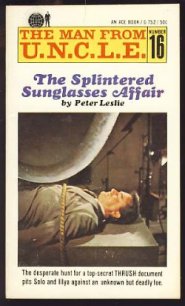The Finger in the Sky Affair - Leslie Peter (читать хорошую книгу полностью .TXT) 📗
"Or wrong interpretation by the gear to give the effect of this?"
The dark man with the moustache shrugged. For the first time, he removed the pipe from his mouth. "You must appreciate my position," he said, jetting a small cloud of smoke into the air. "We make the gear, after all. As there's no evidence of faultiness after the crash, we feel it's not up to us to ferret out reasons why it might have been at fault—though of course we should accept any conclusive evidence found by someone else."
"I understand," Solo said. "And you can't think of any device—or set of conditions, to use your phrase—under which the part of the gear affecting height readings or glide angle could be momentarily distorted, and yet return to normal afterwards?"
The Technical Director jammed the pipe back into his mouth. "Oh, have a heart, old chap," he said. "Have a heart."
Later, Solo and Illya spent some time studying the technical drawings of the Murchison-Spears equipment—with particular emphasis on those parts of it affecting the height of the aircraft and the automatic control of this.
"I can see the principle," Solo said. "But I'm afraid the detail is a bit too..."
"No, no, Napoleon," Illya said. "It is relatively simple. Look...after the scanner tube has...Look!...Here...This is where, if it was just giving a reading, the electronic pulse would be turned into a visual indication, on a dial. See?"
"Ye-e-es. I'm with you so far. Just."
"Well, since it's not just giving a reading—but causing the plane to react as a pilot would after digesting that reading—the electronic information feeds in...here. In this small memory storage unit."
"Something like a computer?"
"On a far less complicated scale, yes...And then these selectors...here...and here...and here...See, the contact is made by this core of toridium. As you know, it's a metal whose coefficient of expansion is —"
"No, Illya, no!" Solo said firmly. "This is way beyond me. Let me leave the technical stuff to you. When you have an idea, tell me—and we'll act on it. Until then, you're on your own, boy!"
"Just as you like, Napoleon. I think I might have the glimmering of an idea how someone might—just might—begin to make...what did the man say?"
"A set of conditions?"
"That's it! A set of conditions! A set of conditions in which this equipment might be made to react falsely without permanently damaging it...but I'd like to brood on it before I commit myself."
"You do that. In the meantime, we'll start on the social side, as we said..."
* * *
At seven thirty, they met Helga for a drink in the airport lounge. Sheridan Rogers had still not returned to her apartment, nor had she left any message at the T.C.A. office or in the bureau at the terminal building. They gave her a half hour and left at eight o'clock—calling once again at the empty apartment on the way to Haut-des-Cagnes.
Illya, customarily a reserved companion, was abnormally quiet and worried during the short journey. Solo and Helga, torn between the extremes of failing to cheer him up and appearing too flippant in the face of his obvious distress, struck a kind of subdued bantering note in their exchanges as the car sped along the motor road to Cros-des-Cagnes and then turned inland towards the medieval village perched so picturesquely above it. From the coast, Haut-des-Cagnes presents a symmetrical aspect—a pyramid of rough, red-tiled Proven?al roofs crowned by a 14th century Grimaldi castle, beneath whose floodlit and crenellated keep the place clusters at night. But the visitor who ventures along either of the valleys running inland to each side of it soon sees the village in a different perspective. It is built—for a start—at the end of a spur and not on a hillock...so that a moving viewpoint presents constantly shifting profiles. At one moment, the emphasis seems to be rectangular—a line of picture-postcard houses serrating the sky at the top of a squared-up bluff; the next minute, the picture is all zig-zags—a series of slopes linked by hairpin bends, the whole complex rising to stone ramparts and punctuated by clusters of cottages clinging to the wall as tenaciously as the bougainvillea which covers them. And yet on the far side of the valley, a little higher up, an onlooker would characterize the place as a series of stepped terraces, rectangular plots and parcels of land related vertically by the swooping walls of villas and the trailing profusion of flowers hanging from their balustrades.
Illya drove about a kilometer along the road leading inland to Vence and then made a steep, climbing turn back to the right, approaching the old village from the north.
The center of social life in Haut-des-Cagnes is the place at the very summit of the pyramid—a small square dominated by the battlemented turret of the keep. Here a handful of expensive and chi-chi boutiques and souvenir shops vie with the three cabaret-restaurants in the laudable task of parting the tourist painlessly and as elegantly as possible from his money. And here in the summer—especially in August—an absurd and ludicrous number of cars attempt to park.
As the 404 negotiated the narrow, steep streets leading by degrees to the place, it became increasingly necessary to stop and allow other vehicles room for manoeuver—despite the traffic lights which in a desultory way tried to regulate the traffic coming up and down. As always, the square was full, and people on their way to the boutiques or the cafes had left their cars absolutely anywhere: they lined the constricted roadway, projected across intersections, blocked the exits from drives and garages, balked those wishing to turn and sprawled across every available inch of space in the congested village. Illya was eventually forced to turn around at the top and drive down again to a square only halfway up the ramparts. After waiting a moment here, they slid into a space vacated by a departing Belgian and climbed back to the place at the top via a steep stone staircase.
The party from T.C.A.—there were really three separate parties—was easy enough to identify. The alert young men and women in their crisp uniforms had taken over the three outside tables on one of the cafe terraces.
Helga, Illya and Solo took a table nearby and watched them curiously for a while. But the stereotyped banter, the stereotyped horseplay and the expected ploys soon palled and they began to look around at the other tourists there. Next door to their restaurant was another, and those sitting outside under the floodlit vine pergolas were separated from them only by a row of white fencing running from the junction of the two buildings. It was very warm in the soft summer darkness—a little humid, perhaps—and the shrill banalities of the holidaymakers sounded loud in the night air. On the far side of the square, beyond the massed lights of the parked cars, away from the milling convolutions of the cafe patrons, blue-clad men with lined faces the color of walnuts played a quiet game of petanque.
After a while, someone came out onto the terrace with an accordion and sang. They drank a bottle of cold, aromatic Alsatian white wine and ordered another. A second cabaret performer drifted among the closely packed tables playing a guitar and singing American folk songs. In the distance, they could hear the first singer and her accordion entertaining customers in the basement of the next-door cafe.
Automobile engines started up, revved and whined away in low gear. New arrivals labored up the hill seeking a place to park. Every now and then a burst of applause or a concerted shout of laughter testified to the success of the evening.



![[The Girl From UNCLE 04] - The Cornish Pixie Affair - Leslie Peter (электронная книга .txt) 📗](/uploads/posts/books/56865/56865.jpg)
